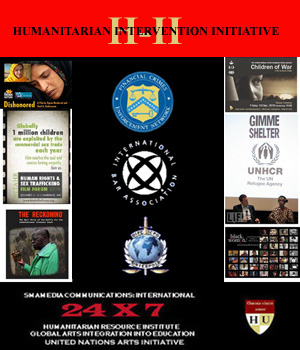26 May
2011 - Updated 5 March 2014
Contact: Stephen M.
Apatow
Founder,
Director of Research & Development
Humanitarian
Resource Institute (UN:NGO:DESA)
Humanitarian University
Consortium Graduate Studies
Center
for Medicine, Veterinary Medicine & Law
Phone:
203-668-0282
Email:
s.m.apatow@humanitarian.net
Internet:
www.humanitarian.net
H-II
OPSEC
Url:
www.H-II.org

HRI: Appeal to International Bar Association - Tools
for
Restructure
Stephen Michael Apatow, [1] founder of Humanitarian Resource
Institute
and International Disaster Information Network [2] has submitted a
request to the
International Bar Association for tools to assist restructure in 193 UN
member countries, debt relief proportional to damages caused by
unregulated market activities and interrelated financial crimes during
the 1999-2011 time period. [3] Apatow
emphasizes:
"It is critical that
world
leaders focus on long term solution oriented objectives that will
address
the humanitarian emergency, oil shock and food crisis that
continues
to devastate every UN member country."
As noted in discussions associated with the Academy Award: Best Documentary
Film in
2010
"Inside Job,"
[4] and HBO
docudrama "Too Big To
Fail," [5] was the concept of "Too Difficult
To Understand." This is why
the
root cause of the financial crisis must be identified and targeted to
prevent
our next crisis, that could technically come today, with the right
trigger
or shock.
See: Credit
Default Swaps: Economic
Crisis Contingency Discussions: June 2011.
Root Cause: The wall erected
or legal barrier established by the
Banking Act of 1933 or Glass-Steagall Act that separated FDIC insured
banks and Wall Street investment banks was repealed in 1999. This
provided access of low interest central bank lending facilities to
investment banks, (funding speculative trading of stocks, commodities,
etc.), that was only accessible to FDIC insured banks.
Note: This coincidentally occurred in conjunction with the most
significant technological challenge to face humanity, known as the
Year 2000 Conversion (Y2K). [6] This global event required a global
liquidity infusion by central banks, to assist 192 countries with
remediation. Stephen M. Apatow, founder, director of research and
development for the Humanitarian Resource Institute has been working
with global infrastructure analysis and contingency planning since
1999. In cooperation with FEMA, the Humanitarian Resource
Institute established the International Disaster Information Network
(IDIN) to assist global preparedness initiatives associated with
Y2K.
Secondary Factor: Deregulation of the OTC derivatives market and
shadow banking system, that was used to fuel the speculative trading of
the investment banks. This was accomplished through the
"Commodity Futures Modernization Act of 2000." This allowed the
unregulated shadow banking system, leveraged by investment banks, that
now had access to central bank lending facilities (normally available
only to FDIC insured banks), expansion to $1.4 Quadrillion or $1,400
Trillion in 2006. [7] This represents the size and scope of
unregulated distortions in the global financial system, that are now
the target of OTC derivatives fraud and financial crimes investigations
across the globe.
Why are the Banks still considered Too Big To Fail?
Because the investment banks have been allowed to remain connected to
the FDIC insured commercial banks, extending the risk of the investment
banking activities, that include the unregulated OTC derivatives market
and shadow banking system, to the FDIC insured banks.
What are the solutions that can stabilize the U.S. and global financial
system?
1. FDIC insured commercial banks must be separated from the investment
banks, so that all legitimate FDIC insured banking activities, are no
longer placed at risk. In 2011, this brings us back to the same
solution, to the same crisis, that followed the 1929 market crash....
The Banking Act of 1933 or Glass-Steagall Act that separated the FDIC
insured commercial banks from the investment banks.
2. All OTC derivatives in the shadow banking system must have 100%
oversight by the appropriate regulatory agencies.
In deepest appreciation of Film Arts Integration Into Education,
supported by the United Nations Arts Initiative, [8]
that has helped facilitate these crucial efforts to protect our life
savings
and futures of our children.
References:
1. Leadership Development:
Achieving The Impossible: Humanitarian Resource Institute.
2. International
Disaster Information Network (IDIN): Humanitarian
Resource Institute.
3. Timeline: Decade From
Hell: Humanitarian Resource
Institute, Updated 17
July 2013.
4. Inside
Job - Prosecution for Financial Crimes Top Priority - FINCEN -
Interpol - IBA: HRI-ICC: Humanitarian Resource
Institute, 19 April 2011.
5. Too Big to Fail:
HBO Documentary.
6. Year 2000 Conversion:
Global Infrastructure Analysis and Contingency
Planning: Humanitarian Resource Institute.
7. Remarks
by Jill Considine: At the joint
European Central
Bank/Federal Reserve Bank of Chicago Conference on “Issues Related to
Central Counterparty Clearing” Frankfurt, Germany, April 4, 2006.
8. United Nations Arts
Initiative: Humanitarian Resource Institute.
|